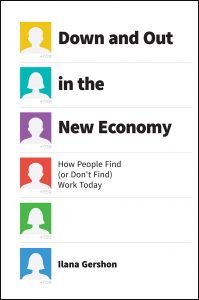Personal Branding is blasé auto-fan fiction and other notes on the new economy

“Personal branding” seems the provenance dystopian fiction—equal parts Idiocracy and neoliberal end game, one would think its merely a belabored joke about the individual in late capitalism, rather than a facts-on-the-ground-style employment strategy. “You are your brand!,” isn’t a line from 1984, though: it’s part and parcel of almost any TedTalk on the job market, despite the fact that—according to anthropologist Ilana Gershon, whose recent book Down and Out in the New Economy: How People Find (Or Don’t Find) Work Today is profiled in the Quartz review excerpted below—it rarely results in, um, an actual job. Read more from the Quartz piece after the jump.
***
Gershon, a professor of anthropology at the University of Indiana, Bloomington, spent a year interviewing and observing job seekers and employers in Silicon Valley and around the US. Her new book, Down and Out in the New Economy: How People Find (Or Don’t Find) Work Today explains that branding is largely a boondoggle advanced by inspirational speakers and job trainers. It doesn’t help people get jobs. . . .
According to Gershon, the concept of personal branding developed over the last 30 years as the concept of work itself became more precarious. Union membership has contracted. The number of hours in the average work week has risen; full-time adult workers spend 47 hours a week working on average, which is up an hour and a half from ten years ago. Today, millennials average four jobs in their first 10 years out of college, twice as many as the average for the generation before them. Workplaces are demanding more time and offering fewer protections and stability.
This change has a lot to do with the relationship between employer and employee. According to Gershon, in earlier eras, employees saw their relationship with an employer as a kind of loan of time and skills. You rented out your services for a certain period, and then the rest of the day was your own. Increasingly, however, people have begun to see themselves as individual businesses. And the employer-employee relationship is starting to feel more and more like a contract between two business enterprises. Meanwhile, companies like Uber, in which employees are all independent contractors, present themselves as the ideal future of work (though Uber looks less and less ideal all the time.)
In this context, branding, Gershon argues, isn’t a way to get a job. Rather it’s a way to reconcile oneself to an economy that provides less and less security. Without unions and without job security, employment is precarious and life outside work withers away. Gershon explains that, “The self as business is a metaphor that people developed to think through how they can operate in a space which is completely defined by market logics.”
This way of thinking can help people feel like they fit into the current market. But it has its downsides, too—plenty of them. The main problem with branding yourself as a business, Gershon says, is relatively simple: “People are human beings with physical needs and with personal lives outside of the business,” she says. “They are not always on; they have a personal life.”
***
To read the Quartz review in full, click here.
To read more about Down and Out in the New Economy, click here.